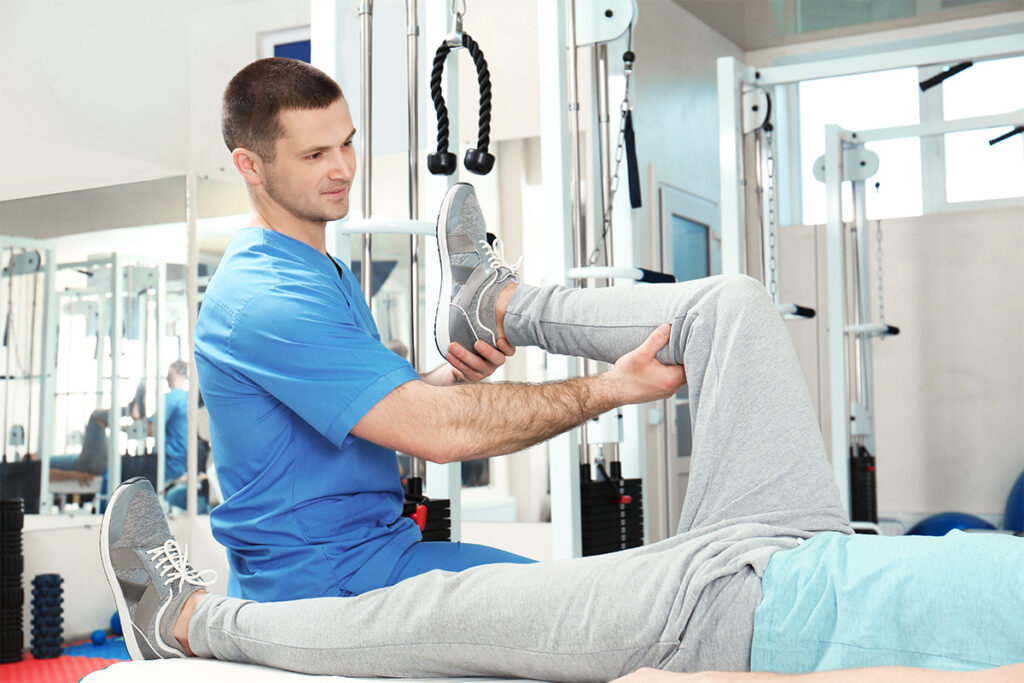If you’ve dreamed of turning your passion for sports and health into a profitable side venture, now is an excellent time to start. The growing wellness industry has created diverse opportunities for those with sports science knowledge to develop rewarding side hustles.
Research suggests that side ventures provide financial benefits and enhance career satisfaction and professional development.
This guide explores the most practical sports science side hustles and provides actionable steps to help you get started.
Whole person care is the future.
Fullscript puts it within reach.
healthcare is delivered.
Coaching and instruction-based side hustles
Sharing your knowledge through coaching represents one of the most accessible entry points into sports science side hustles. These opportunities let you make a direct impact while generating income.
Personal and group training
Personal training offers a flexible way to apply your sports science knowledge while helping others achieve their fitness goals.
You can work part-time at gyms or independently with clients in their homes or outdoors. Evidence suggests that personalized training supports better exercise adherence compared to self-directed workouts.
Group fitness instruction allows you to work with multiple clients simultaneously, maximizing impact and earning potential. Popular formats include HIIT, strength classes, or specialized training for specific populations. Research indicates that group settings may help enhance motivation through social connection.
Outdoor boot camps and running clubs require minimal equipment and overhead, making them excellent beginner options. These formats combine training with nature exposure, which some studies suggest supports mood and stress management.
Check local regulations regarding permits for commercial activities in public spaces before starting.

Sports coaching and athletic development
Youth sports coaching provides opportunities to apply sports science principles to developing athletes. Community leagues, schools, and private clubs seek qualified coaches for various sports.
Focus on fundamental movement skills, proper technique, and creating positive experiences that foster long-term enjoyment of physical activity.
Strength and conditioning for athletes allows you to support performance enhancement and injury prevention through specialized training. Programs can be offered to individual athletes or entire teams independently or through partnerships with existing sports organizations.
Specialized movement coaching, such as swimming instruction, running mechanics, or Olympic lifting technique, applies biomechanical knowledge to help clients master specific skills.
Clients seeking this specialized training often invest in expertise that addresses their particular goals or challenges.
Senior and corporate wellness
Corporate wellness programming has expanded as organizations recognize the connection between employee well-being and productivity. Opportunities range from leading lunchtime fitness sessions to developing comprehensive wellness initiatives for companies.
Senior fitness programs address the growing need for appropriate exercise guidance among older adults. Evidence suggests regular physical activity supports mobility, balance, and quality of life throughout aging.
These programs can be offered through community centers, retirement communities, or as specialized small-group training.
Content creation and digital hustles
The digital landscape offers opportunities to share your sports science knowledge while creating scalable income streams requiring less direct investment than one-on-one services.
Fitness writing and blogging
Freelance writing for fitness and sports publications allows you to apply your technical knowledge in an accessible format.
Publications from mainstream fitness magazines to specialized sports journals frequently seek contributors with expertise. Building a portfolio of published work can create a steady stream of writing assignments.
Developing your own blog provides creative control and multiple potential revenue streams through advertising, sponsored content, affiliate marketing, and as a platform to promote your services. Focus on creating content that combines scientific accuracy with practical application.
Always disclose any financial relationships, including affiliate links or sponsorships, in accordance with FTC guidelines.
Podcasting and video production
Fitness podcasting allows for in-depth discussions and interviews about sports science topics. Podcasts can be monetized through sponsorships, listener support platforms, or as marketing channels for your other offerings.
YouTube fitness content lets you share demonstrations and visual explanations of sports science concepts. Successful channels typically focus on specific niches, such as evidence-based training or sport-specific techniques. Income comes from platform advertising, brand partnerships, or driving traffic to your services.
Video courses transform your knowledge into structured educational experiences that generate ongoing revenue. These digital products allow you to reach more people than possible through direct services alone. Create comprehensive resources with clear progressions to maximize value for participants.
Social media and affiliate income
Building a social media presence establishes you as a trusted resource in specific areas of sports science. Growing your following can lead to partnerships, sponsored content, and promotion of your offerings.
Affiliate marketing involves earning commissions by recommending relevant products to your audience, such as fitness equipment or online courses. Partner with companies whose products align with your expertise, only promoting items you genuinely support.
Product and service-based side hustles
Creating tangible products or specialized services leverages your sports science knowledge beyond direct coaching or content creation.
Nutrition and meal services
Meal planning services combine nutritional knowledge with practical support for clients seeking to improve their eating habits.
When providing nutrition guidance, be mindful of your region’s scope of practice limitations. Some areas restrict specific nutrition advice to registered dietitians or other licensed practitioners.
Cooking demonstrations and workshops teach practical food preparation skills that support healthy eating habits. Combine evidence-based nutritional guidance with realistic, accessible recipes that clients can easily implement.
Physical products and merchandising
Fitness equipment innovation provides opportunities to develop specialized training tools that address specific needs. Start with small production runs to test market response before scaling manufacturing.
Fitness apparel and accessories represent another product-based opportunity within the sports science space. Consider starting with a focused product line that addresses a specific need within your target audience.
E-commerce and digital sales
Training programs and ebooks transform your knowledge into digital products that generate ongoing revenue. Well-designed programs addressing specific goals can provide significant value without requiring your direct time for delivery.
Online fitness communities and membership sites provide recurring revenue while delivering ongoing value to subscribers. These platforms can include workout libraries, nutrition resources, expert Q&As, and community features to enhance adherence.
Events, experiences, and consulting
In-person and virtual events allow you to share your expertise in interactive formats while creating valuable experiences for participants.
Workshops and speaking engagements
Specialized workshops allow you to share in-depth knowledge on particular topics in immersive formats. These events typically command higher price points than regular classes. Consider partnering with existing facilities to host workshops while building your audience.
Speaking at conferences and events positions you as an expert while potentially reaching new audiences. Industry events, corporate wellness programs, and community organizations frequently seek knowledgeable presenters on sports and health topics.
Fitness consulting services
Sports program design for schools and organizations applies your knowledge to creating effective training systems at an institutional level. Services include designing seasonal training programs or developing coach education materials.
Facility design consulting helps gyms, schools, and community centers create effective training environments. This specialized service applies knowledge of exercise science to optimize spaces for particular training goals or populations.
Planning, branding, and scaling your side hustle
Strategic planning and clear positioning can transform a casual side project into a sustainable business.
Identify your niche and offerings
Finding your unique positioning involves identifying specific needs where your combination of knowledge, experience, and interests creates distinctive value.
Specialized offerings addressing underserved needs establish stronger market positions than generalist approaches.
Test your concepts by conducting surveys, offering limited pilot programs, or pre-selling services to gauge interest before the full launch. This provides valuable feedback while creating initial momentum through early testimonials.
Build a personal brand
Create a cohesive brand identity that communicates your philosophy, expertise, and the experience clients can expect. Consistency across all touchpoints builds recognition and trust over time.
Establish credibility through relevant certifications, testimonials from satisfied clients, case studies showing results, or content demonstrating your expertise.
Marketing and client acquisition
Maintain an informative website and strategic social media presence focused on creating valuable content that addresses common questions your target audience faces.
Build referral networks with complementary professionals, such as physical therapists, nutritionists, or physicians, who serve similar populations but offer different services.
Frequently asked questions (FAQs)
Here are some frequently asked questions about fitness and sports science side hustles.
Which fitness side hustle pays the most?
Due to scalability, digital products and online coaching generally offer the most substantial earning potential. These approaches allow servicing of multiple clients or sell products without requiring additional time for each transaction.
Can I start a side hustle with no certification?
Yes, it is possible to start certain sports science-related side hustles—such as content creation, general wellness education, or product ideation—without formal certification. However, appropriate credentials or licenses may be required depending on the nature of the services offered, especially in areas involving coaching, training, or individualized consulting. Obtaining recognized certifications can also enhance your credibility and ensure compliance with legal and professional standards.
What’s the best hustle if I have limited time?
Content creation and digital products offer excellent flexibility for those with limited availability. These approaches allow the creation of assets that continue generating value without requiring ongoing time.
How do I grow my side hustle into a full business?
Transition from side hustle to full-time business by systematizing your offerings, building consistent client acquisition channels, and diversifying your revenue streams. Develop clear packages and create systems for delivering consistent quality.
Key takeaways
- Sports science side hustles offer valuable opportunities to share knowledge, develop new skills, and create additional income aligned with your passion.
- Start with approaches that match your current skills and available time, then allow your side hustle to evolve as you gain experience.
Whole person care is the future.
Fullscript puts it within reach.
healthcare is delivered.
References
- Bloom, G. A., Dohme, L., & Falcão, W. R. (2020). Coaching Youth Athletes. In Springer eBooks (pp. 143–167). https://doi.org/10.1007/978-3-030-63912-9_8
- Edelman, B., & Brandi, W. (2015). Risk, Information, and Incentives in Online Affiliate Marketing. Journal of Marketing Research, 52(1), 1–12. https://doi.org/10.1509/jmr.13.0472
- Gubler, T., Larkin, I., & Pierce, L. (2017). Doing Well by Making Well: The Impact of Corporate Wellness Programs on Employee Productivity. Management Science, 64(11), 4967–4987. https://doi.org/10.1287/mnsc.2017.2883
- Hamzah, N. M., & Matkhairuddin, S. (2023). Impact of Non-Financial Rewards on Employees’ Job Satisfaction. ResearchGate. https://www.researchgate.net/publication/377979148_Impact_of_Non-Financial_Rewards_on_Employees’_Job_Satisfaction
- McClaran, S. R. (2003, March 1). The Effectiveness of Personal Training on Changing Attitudes Towards Physical Activity. https://pmc.ncbi.nlm.nih.gov/articles/PMC3937569/
- Motl, R. W., & McAuley, E. (2010). Physical Activity, Disability, and Quality of Life in Older Adults. Physical Medicine and Rehabilitation Clinics of North America, 21(2), 299–308. https://doi.org/10.1016/j.pmr.2009.12.006
- Sheth, J. N. (2011). Impact of Emerging Markets on Marketing: Rethinking Existing Perspectives and Practices. Journal of Marketing, 75(4), 166–182. https://doi.org/10.1509/jmkg.75.4.166
- Storer, T. W., Dolezal, B. A., Berenc, M. N., Timmins, J. E., & Cooper, C. B. (2013). Effect of Supervised, Periodized Exercise Training vs. Self-Directed Training on Lean Body Mass and Other Fitness Variables in Health Club Members. The Journal of Strength and Conditioning Research, 28(7), 1995–2006. https://doi.org/10.1519/jsc.0000000000000331
- VU Research Repository. (n.d.). VU Research Repository | Victoria University | Melbourne Australia. https://vuir.vu.edu.au/41810/
- Walton, G. M., Cohen, G. L., Cwir, D., & Spencer, S. J. (2011). Mere belonging: The power of social connections. Journal of Personality and Social Psychology, 102(3), 513–532. https://doi.org/10.1037/a0025731
- Williams, J., & Chinn, S. J. (2010). Meeting Relationship-Marketing Goals Through Social Media: A Conceptual Model for Sport Marketers. International Journal of Sport Communication, 3(4), 422–437. https://doi.org/10.1123/ijsc.3.4.422
- Zhang, J. J., Lichtenstein, Y., & Gander, J. (2015). Designing Scalable Digital Business Models. In Advances in strategic management (pp. 241–277). https://doi.org/10.1108/s0742-332220150000033006





